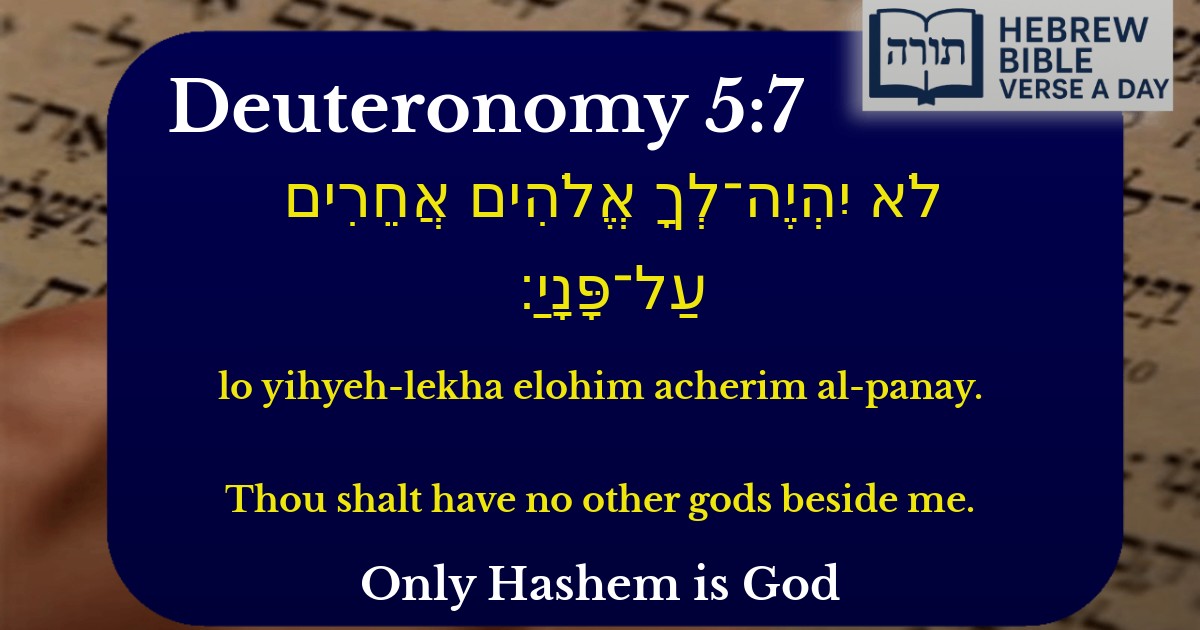Frequently Asked Questions
Q: What does 'Thou shalt have no other gods beside me' mean?
A: This verse, from Deuteronomy 5:7, is the first of the Ten Commandments. It teaches that we must recognize Hashem (G-d) as the one and only true G-d and not worship or believe in any other deities or powers. Rashi explains that this commandment includes not even acknowledging the existence of other gods in one's heart.
Q: Why is this commandment so important in Judaism?
A: This commandment is foundational because it establishes the principle of monotheism—the belief in one G-d. The Rambam (Maimonides) lists this as the first of his 13 Principles of Faith. Without this belief, the rest of the Torah's commandments would lack meaning, as they are based on our relationship with Hashem alone.
Q: How does this verse apply to us today?
A: Even though idol worship in its ancient form is rare today, the Sages teach that 'other gods' can also refer to anything that takes the place of Hashem in a person's life—such as money, power, or fame. The Talmud (Sanhedrin 63a) warns against letting worldly pursuits become our primary focus instead of serving G-d.
Q: What does 'beside me' mean in this verse?
A: The phrase 'beside me' (עַל־פָּנָיַ) is interpreted by Rashi to mean 'in addition to Me'—meaning we should not recognize any other deities alongside Hashem, even if we still worship Him. The Midrash (Sifrei) explains that this includes not making any images or intermediaries to worship G-d through.
Q: Does this commandment apply to non-Jews as well?
A: Yes, this principle is one of the Seven Noahide Laws, which are universal commandments for all humanity. The Rambam (Hilchos Melachim 9:1) states that non-Jews must also reject idolatry and recognize Hashem as the only true G-d.


The Prohibition of Avodah Zarah (Idolatry)
The verse "לֹא יִהְיֶה־לְךָ אֱלֹהִים אֲחֵרִים עַל־פָּנָיַ" (Shemot 20:3) is the first of the Ten Commandments and establishes the foundational principle of absolute monotheism in Judaism. Rashi explains that the phrase "עַל־פָּנָיַ" ("beside Me") means that one must not recognize any other deity in My presence—i.e., at all times and under all circumstances. The Rambam (Hilchot Avodah Zarah 2:1) elaborates that this prohibition includes not only worshiping other gods but even acknowledging their existence as divine powers.
Literal and Expanded Meaning
On a literal level, the Torah forbids serving physical idols or deities worshipped by other nations. However, the Talmud (Sanhedrin 63a) extends this prohibition to any form of worship directed toward something other than Hashem, even if the worshiper does not consider it a god (e.g., worshiping an object as an intermediary). The Sforno adds that this commandment also negates attributing independent power to natural forces, as all existence is sustained solely by Hashem’s will.
Philosophical Implications
Practical Applications
The Shulchan Aruch (Yoreh De'ah 146) rules that any action implying recognition of another deity—such as bowing to an idol or swearing by its name—violates this prohibition. The Mishnah Berurah (Biur Halachah, Orach Chaim 156) further clarifies that even casual customs associated with idolatrous practices are forbidden to avoid the slightest appearance of endorsement.
Midrashic Insight
The Mechilta (Yitro, Parsha 6) compares this commandment to a king who decrees, "Do not entertain other kings in my palace"—emphasizing that the entire world is Hashem’s domain, and no rival sovereignty may be acknowledged within it.